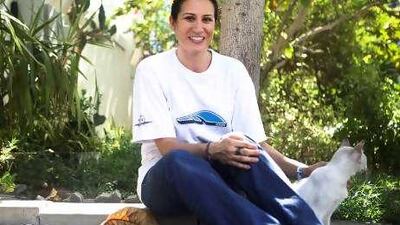ABU DHABI // Tucked behind the wall of an Al Wahda villa, a leafy garden shaded by olive trees and a soaring date palm is the cat's meow of outdoor retreats. Here, some 16 regulars at a time - free-roaming felines from the neighbourhood - stretch over damp spots left behind by air-conditioning condensation, lie napping under blossoming bougainvilleas, scrap, play, lap up water and snack from feeding trays laid out daily by their devoted caretaker.
This is pure luxury for cats, and at their service is Linda Salem, 34, who spends some three hours a day between her job and her gym time tending to the furry squatters. "I count about 10 that I found from the street, which are my garden cats," the Palestinian-German archivist said. "These cats I can touch and cuddle. There were others before, but I think some of them ran off because one of them was being aggressive."
There is Belka - Russian for "squirrel", and so named for her bushy tail. Latte, the constantly sneezing white furball with sky-blue eyes and bizarre allergies. Solaris, whom Ms Salem calls "my little sunshine", arrived frail and with a large abscess on her cheek, which has since healed. Fortunato was the lucky kitten plucked up with his brother and brought to the garden oasis by neighbourhood children, though the sibling did not survive. "And where's Speedy?" Ms Salem asked, moments before a flash of toffee-coloured hair bounded by. "Speedy! He's real fast. You have to see him, how he goes, 'vrrrrrh!' like a little Ferrari."
All of Ms Salem's so-called garden cats were spayed or neutered, a procedure that costs between Dh300 and 400 per patient. And feeding so many cats costs her at least Dh3,000 a month. "All of these cats are street cats," she said. "I'm trying desperately to find them homes. I have at least five or six which, on the spot, I could give away to somebody to care for." Ms Salem worries about Abu Dhabi Municipality's cat culling programme to destroy strays, which city officials consider to be pests.
"If I don't find anyone to take them, at least leave them on the streets," she implored. Ms Salem, who lives with her parents and had pet cats as a child, began to adopt neighbourhood kittens about six years ago. Still, the cats are not permitted in the house; the family owns an African grey parrot and a lovebird, both of which could prove too tempting to the cats. The only one to make it into the home was Tiger, whose hind legs were broken and who required surgery, X-rays and a clinic stay of four months - a Dh5,000 bill borne by Ms Salem.
"I think it was maybe somebody who used some blunt object and hit him because his hipbones were also broken clean on the X-ray, but there were not external injuries," Ms Salem said. "Now when he jumps down, he's like a rock." Tiger has a custom-built cage, equipped with scratching posts and a small jungle gym, on the porch. A fan and a small AC unit are set up to face him. Otherwise, he sleeps in Ms Salem's room.
Ms Salem's mother, Gisella, said the popularity of the household garden had reached the point where she could no longer keep track of the animals' names. "I feel sorry for those poor kittens," she said. "They are coming more and more. It's like a green pasture for them, a jungle where they can hide, cool down. Some lay in the puddles of water from the AC. I don't know if you could call it a resort, but it's like a sanctuary."
mkwong@thenational.ae

